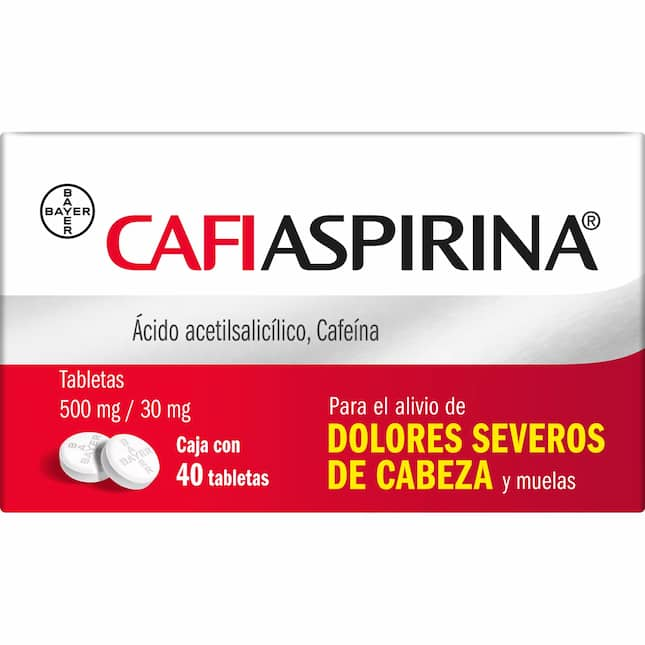Cafiaspirina 500 mg: Usage, Side Effects And Precautions
Cafiaspirina is a drug (500 mg/50 mg) whose active ingredients are acetylsalicylic acid (aspirin) and caffeine.
Cafiaspirina is used to reduce fever and relieve mild to moderate pain from headaches, menstrual periods, arthritis, toothaches, and muscle aches.
In some cases, this medicine is also used to prevent heart attacks in people who have had a heart attack in the past or who suffer from angina (chest pain caused by the heart not getting enough oxygen).
In some cases, it is also used to reduce the risk of death in people who are having a heart attack or have recently had a heart attack.
Cafiaspirina can also be used to prevent ischemic strokes (strokes that occur when a blood clot blocks blood flow to the brain) or mini-strokes (strokes that occur when blood flow to the brain is blocked for a short time).
It should not be forgotten that aspirin, the active ingredient of the drug, does not prevent hemorrhagic strokes (strokes caused by brain bleeding).
Cafiaspirina belongs to a group of medicines called salicylates.
It works by stopping the production of certain natural substances that cause pain, fever, swelling, and blood clots.
Caffeine, another ingredient in the drug, increases the speed of the drug’s effect by increasing blood pressure.

What Will We Learn?
How To Use Cafiaspirina?
This medicine should not be taken on an empty stomach. You can take this medicine with food, especially if you have digestive problems. Swallow the medicine whole with a glass of water without chewing. It is important for your health to take the doses prescribed by your doctor.
The usual dose is 1 or 2 tablets every 4 to 8 hours.
Be careful not to use it for more than 5 days unless your doctor tells you otherwise.
If this medicine is to be used in the elderly and children, a doctor should be consulted.
Cafiaspirina may cause Reye’s syndrome (a serious condition in which fats accumulate in the brain, liver, and other body organs) in children and teenagers, especially if they have a virus such as chickenpox or flu.
Precautions
If you have any health problems, inform your doctor before using this medicine.
If you have the warnings listed below, talk to your doctor before using cafiaspirina:
- Tell your doctor and pharmacist if you are allergic to aspirin, caffeine, other pain or fever medications, tartrazine dye, or any other medications.
- Tell your doctor and pharmacist what vitamins, prescription and nonprescription drugs, nutritional supplements, and herbal products you are taking or plan to take.
- If you are taking this medication regularly to prevent heart attack or stroke, do not take ibuprofen (Advil, Motrin) to treat pain or fever without talking to your doctor. Your doctor will probably ask you to allow some time between taking your daily dose of cafiaspirina and taking a dose of ibuprofen.
- Tell your doctor if you have frequent nasal congestion, asthma, or nasal polyps (growths in the lining of the nose). If you have these conditions, you are at risk of having an allergic reaction to cafiaspirina. Your doctor may tell you that you should not take this medicine.
- Tell your doctor if you frequently experience upset stomach, heartburn, or stomach pain and if you have bleeding problems such as ulcers, anemia, hemophilia, or kidney or liver disease.
If you are having surgery, including dental surgery, tell your doctor or dentist that you are using this medication.
If you drink three or more alcoholic beverages each day, ask your doctor if you should take cafiaspirina or other medications for pain and fever.
Pregnancy And Breastfeeding
During pregnancy, aspirin, the active ingredient of the drug, is considered safe up to 81 mg.
If you are pregnant, do not use this medicine without informing your doctor.
It should be noted that aspirin doses above 81 mg can harm the fetus and cause problems at birth if taken at about 20 weeks or later during pregnancy.
Do not take Cafiaspirina doses above 81 mg (e.g. 325 mg) around or after the 20th week of your pregnancy unless your doctor tells you otherwise.
If you become pregnant while using Cafiaspirina, call your doctor.
Other Medicines And Cafiaspirina
If you are taking any of the medications listed below, inform your doctor:
- Acetazolamide
- Benazepril
- Captopril
- Enalapril
- Fosinopril
- Lisinopril
- Moexipril
- Perindopril
- Quinapril
- Ramipril
- Trandolapril
- Warfarin
- Anticoagulants (‘blood thinners’) such as heparin
- Beta-blockers, and diuretics (‘water pills’)
- Medications for diabetes or arthritis
- Gout medications
- Nonsteroidal anti-inflammatory drugs (NSAIDs)
What Are The Side Effects Of Cafiaspirina?
This medicine may cause side effects, but these side effects do not occur in everyone.
If any of the side effects listed below occur, inform your doctor.
- Nausea
- Vomiting
- Stomach ache
- Painful burning sensation in the chest
The side effects listed below are serious side effects and if these side effects occur, use of the medicine should be stopped and a doctor should be contacted immediately:
- Hives
- Rash
- Swelling of the face, eyes, lips, tongue, or throat
- Difficulty breathing
- Hoarseness
- Rapid pulse
- Rapid breathing
- Tinnitus
- Losing the ability to hear
- Bloody vomit
- Vomit that looks like coffee grounds
- Bright red blood in the stool
- Black or tarry stools
It should not be forgotten that this medicine may cause different side effects.
If you experience any negative effects while using this medicine, inform your doctor.
See also: How Long Does Dilaudid Stay In Your System?
- Does Caffeine Help Modulate and Reduce Pain? – Paininjuryrelief.com
- Aspirin – Medlineplus.gov
